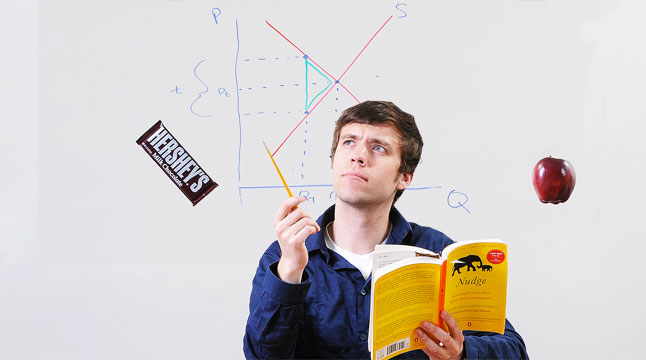
By Jarrad Fjelstad ’10
Seattle, Washington
Economics
After Mac: working on CFA certification, plans on master’s in statistics and public policy
What is behavioral economics? Think about two characters from Star Trek—Spock and Captain Kirk. Spock is cool and logical; Kirk is charismatic and impulsive. Usually the two work together and make good decisions, but sometimes Kirk’s recklessness overwhelms Spock’s logic. Behavioral economics argues that this is a good way to think about what’s going on when we make decisions. Emotions can cause us to procrastinate, to change our preferences, to feel like taking risks sometimes, and other times not.
A key element in this struggle is our evolutionary heritage. Humans have lived much longer in small groups as hunter-gatherers than they have in big cities interacting in impersonal markets, so our instincts are often the hunter-gatherer talking rather than the modern sophisticate. Behavioral economics suggests that emotions such as trust are hard-wired because they helped hunter-gatherers engage in trade, and trading makes us better off. But our hunter-gatherer instincts can also cause us to make mistakes. Persistent mistakes are called biases, and we explored these in my Behavioral and Experimental Economics course.
In behavioral economics the stakes are high, and we students are in on the ground floor.
In one experiment, we created a market for Egg McMuffins and discovered the “endowment effect”—the tendency for those who have been randomly given something to value it more than the unlucky ones who have not. For the term project, I designed and conducted an experiment exploring whether a person’s generosity depends on social context. I learned that we are suckers for stories and often ignore probabilities. I find myself wondering if I will eat that piece of fruit later this evening or if my bias for a chocolate bar means I’ll be having another chocolate bar for an evening snack.
What do these biases mean for the field of economics as a whole? Will behavioral economics simply complicate traditional economics, or will it demand a seismic shift? That is what is exciting about behavioral economics—the stakes are high, and we students are in on the ground floor working to help improve our understanding of human behavior and economic life.